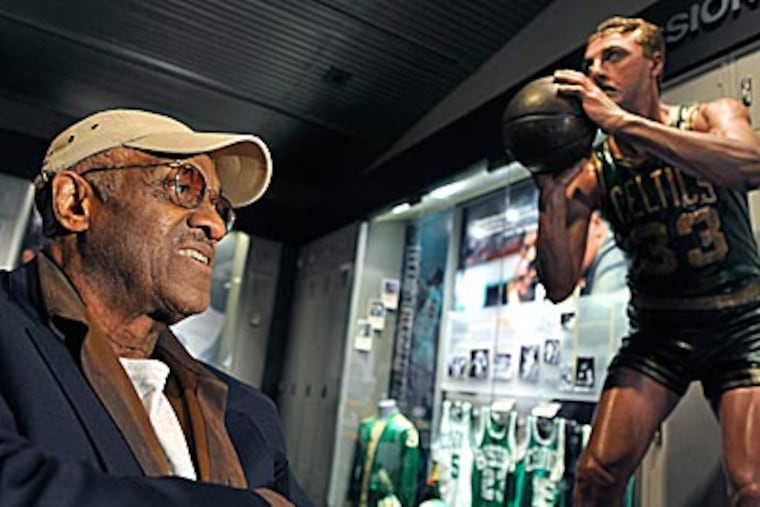Former Sixers great Chet Walker set for Hall induction
Like those of so many athletes who played in an era when a catchy nickname was nearly as essential as physical talent, Chet "The Jet" Walker's was a misnomer.

Like those of so many athletes who played in an era when a catchy nickname was nearly as essential as physical talent, Chet "The Jet" Walker's was a misnomer.
As a Bradley all-American, and even when he starred for a 1966-67 76ers team many still regard as the NBA's best ever, the silky 6-foot-6 forward who turned head fakes into an art form was more super smooth than supersonic.
"I was more rhythm than fast," Walker said earlier this year. "My name was Chester, and they were just looking for something to rhyme with Chet. Everyone had to have a nickname."
Friday night in Springfield, Mass., Walker will be one of 12 inducted into the Basketball Hall of Fame. For him, the ceremony, at which he will be presented by 76ers teammate Billy Cunningham, will be long overdue.
"If you look at who's in there and compare my statistics to some of them, certainly I should have been in a long time ago," Walker told the Omaha Journal Star. "I'm disappointed, not only for myself, but for a lot of close friends and my brothers who aren't alive now."
Though Walker moved on to become a four-time all-star with the Chicago Bulls, Philadelphians will forever recall him as one of the key contributors on a Sixers team that went a then-record 68-13, crushed the hated Celtics in the Eastern Conference finals, and cruised to the NBA title.
He averaged 19 points and eight rebounds a game playing in a potent lineup that also included Wilt Chamberlain, Luke Jackson, Hal Greer, and Wali Jones, with Cunningham as its sixth man.
And while he would become known for his outspokenness in Chicago, a forceful union representative whose career ended after he sued the Bulls, Walker's tenure here, in the enormous shadows cast by Chamberlain, was relatively quiet.
"You play with Wilt," Walker said, "and you are not getting a lot of publicity."
An essential member of Alex Hannum's juggernaut, Walker was the Sixers' third-leading scorer (behind Chamberlain and Greer) and rebounder (trailing only Chamberlain and Jackson).
While Chamberlain and Jackson provided an enormous interior presence, and Greer and Jones were skilled jump shooters, the shifty small forward was one Sixer who could isolate and break down a defender on the wing.
"He had more moves than a hula dancer," Larry Costello, who died in 2001, once said of his Philadelphia teammate.
A Michigan native and a two-time, first-team all-American at Bradley, where he averaged nearly 25 points a game, Walker was the first pick of the Syracuse Nationals in the 1962 draft. A year later, when the franchise relocated to Philadelphia, he became a 76er.
He was a three-time all-star in six seasons here and a remarkably consistent performer, averaging 16 points and eight rebounds a game and earning three all-star berths.
"He's a very smart guy, very cerebral," said John Baum, the Temple product who played with Walker in Chicago. "Physically, he's not a guy you would look and think, 'There's an all-star player.' But he was. He had a lot of ways to beat you."
In 1969, Walker went to the Bulls in a bizarre transaction that illustrates the more casual NBA age in which he played.
According to Pat Williams, Sixers GM Jack Ramsay wanted to trade Walker to the Bulls for forward Jim Washington. But the Bulls were without a GM. Ramsay then allowed Williams, his assistant, to take the Chicago job provided he approved the Walker-Washington deal.
"I can remember a lot of games in Chicago when Dick Motta was our coach, and it would come down to the final seconds of the fourth quarter, and Chet would say, 'Get me the ball,' " Baum recalled. "That's the kind of confidence he had in himself and we had in him. He was either going to make the basket or make you foul him."
Walker was elected to the Hall by the veterans committee. He suggested that his long wait for admission may have been the result of his union activities as a player.
During a 1975 contract impasse, Walker sought a trade or release. When the Bulls refused, he sued.
"[Bulls owner] Arthur Wirtz, told me the lawsuit would ruin the game," Walker said. "He told me I would never play in the league again."
He lost the case and, unable to find another team despite coming off a season in which he had averaged 19 points, was forced to retire at 35.
"I'm glad he got in. It was long overdue," Baum said. "If you have problems with how you approached the media or your owners, it comes into play, and it should not."
Walker was a Bradley assistant for a time before moving to Los Angeles, where he produced several TV shows and films.
The other 11 Hall inductees are longtime NCAA official Hank Nichols, a Villanova professor; former Indiana Pacers star Reggie Miller; longtime NBA coach and player Don Nelson; Virginia's Ralph Sampson; UCLA's Jamaal Wilkes; two-time Olympic gold-medalist Katrina McClain; African American pioneer Don Barksdale; international coach Lidia Alexeeva; ABA star Mel Daniels; Nike cofounder Phil Knight; and the Red Heads, an early barnstorming women's team